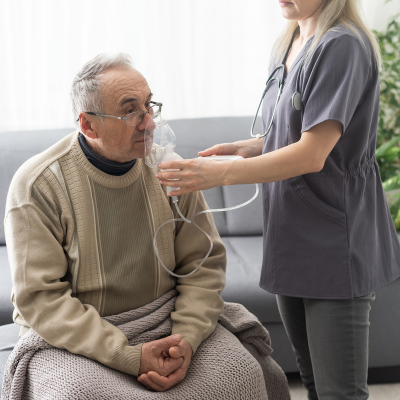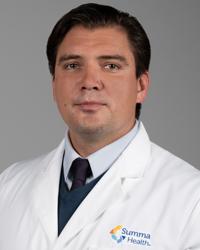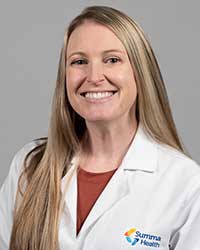Breathe Easier: Exploring COPD Treatment Options [Podcast]
Posted October 16, 2024

Featured Speakers:
Aliaksandr Ramaniuk, D.O.
Sarah Serb, CNP
Ryan Saltsman, BSN, Medsurg-BC
Scott Webb (Host): COPD affects millions of Americans and I'm joined today by a few members of the Pulmonary Team at Summa Health to discuss COPD and the latest treatment options. Joining me today are Dr. Aliaksandr Ramaniuk, Pulmonary and Critical Care Physician, Sarah Serb, Lead APP and Program Coordinator for Pulmonary Medicine, and Ryan Saltzman, Registered Nurse Clinical Coordinator, and they're all with Summa Health.
This is Healthy Vitals, a podcast from Summa Health. I'm Scott Webb.
Want to thank you all for joining me today. We're going to talk about COPD and different treatment options and a whole plethora of things. So, Doctor, I'm going to start with you. How do healthcare providers decide on the best treatment plan for a patient with COPD?
Aliaksandr Ramaniuk, D.O: Scott, thank you for asking that question because today, in 2024, COPD is a completely different disease than what we remember. It is a disease that requires specific diagnosis and very targeted, specific treatments. It's a disease that affects up to 10 percent of the population and globally is the third leading cause of death.
So, it needs to be diagnosed very accurately, as early as possible. And the therapy needs to be targeted. We diagnose it with multiple modalities, including breathing tests and spirometry, imaging, and our goal is to identify specifically what type of COPD you have and find the right therapy for that.
Host: All right. So good to know there's different types of COPD. And as you say, with many things in medicine, of course, but especially with COPD, early and accurate diagnosis is key. And Sarah, when someone is newly diagnosed with early onset COPD, what treatment options may their provider prescribe or recommend?
Sarah Serb, CNP: As Dr. Ramaniuk said, there's many different treatment options out there now for patients with COPD, it's just not one specific type. We really like to personalize our treatment plan with the patient. Most importantly, we like to get rid of any type of factors that may be contributing to the patient developing COPD, such as smoking.
So we always recommend smoking cessation or quitting smoking, which we can help with as well. Some of the main treatment options we have are inhalers, that patients actually use and it's directed therapy right into the patient's lungs to help open up their airways and let them breathe a little bit easier.
We always recommend exercise or activity so that patient's functional status stays well and their muscles are strong. Sometimes in later stages of COPD, we do recommend oxygen therapy.
Host: All right. So good to know that there are options for folks and just stay with you, Sarah, wondering if you can break down some of the most common COPD medications and, you know, broadly speaking, how they work.
Sarah Serb, CNP: Some of the most common COPD medications are inhalers. There are different types of inhalers out there. Some of them have inhaled steroids, which helps reduce the inflammation in your airways. We have inhalers that are bronchodilators, which help open up your airways and let the airflow become better so that you're breathing a little bit easier.
These are given through multiple modalities. They can be in a powder form, in a meter dose form, a mist form, but they usually help patients reduce some of their daily symptoms that they're having with COPD.
Host: Yeah, let's bring Ryan in here. He's the inhaler guy, if you will. Ryan, we're talking here, there's different types of inhalers, but I'm sure it's important that patients use their inhalers correctly, right?
Ryan Saltsman, BSN, Medsurg-BC: That is correct, Scott. It is very important that a patient uses their inhaler correctly. By using proper technique, they are able to get the medication deep into their lungs and have the inhaler actually work. There are different devices that we can give patients to help them, such as a spacer. They can get that from their local drugstore or, you know, their pulmonologist can order it through a medical equipment company so that it holds the medication in a chamber a little bit longer so they don't have to time the breath as accurate.
Host: Let's talk about the stages a little bit, Ryan. I'm sure there's different, as we're identifying here, different types of COPD, probably different stages within the types. So, is there a particular stage of COPD when oxygen therapy may be prescribed?
Ryan Saltsman, BSN, Medsurg-BC: There is not. So, in order for a patient to qualify for oxygen therapy, we use a couple different factors in checking and testing for whether they need oxygen or not. And one of our biggest tests that we do, it's a six minute walk, and we use a pulse ox, which measures blood oxygen levels in the patient to see if they drop, do they need oxygen? And if we give them oxygen, how much do we actually need? So by doing these two types of tests, we can gauge how much oxygen that are actually are going to be required of the patient.
Host: Yeah, bring you back in. Sarah. Let's talk about the different ways that oxygen therapy can be administered. It seems obvious to me, but it's great to have experts on to really tell us. So what are the different ways it's administered?
Sarah Serb, CNP: Oxygen therapy can be administered via a nasal cannula, which is a small clear tube that's inserted into your nostrils that we can titrate the flow of the oxygen therapy up according to what the patient needs to have a good pulse oximeter oxygen reading. That is the main form of oxygen therapy that we use for patients in the outpatient setting or through the office.
There are also more advanced oxygen devices that deliver more high flow therapies, so higher amounts of oxygen when patients need to get them. And then also we have a lot of our patients that wear machines at night time to help with their oxygenation and we deliver oxygen through positive pressure machines as well.
Host: Alright, so we've got inhalers, we've got oxygen. I'm sure, Doctor, that folks are gonna want to know, well, what about surgery? Is that an option? And what would that mean? So let's talk about the surgical options that are available to treat COPD.
Aliaksandr Ramaniuk, D.O: Our goal initially, again, is to have this team approach to identify a direct therapy that the individual needs that's focused on the requirements that we want to always try to focus on the least invasive options. But certainly as the disease progresses, sometimes we need to have more invasive and aggressive options to help improve our quality of life.
And again, this brings in more members in addition to me, Ryan, and Sarah, to help treat the patient. This is why it requires a team's approach. Some of the surgical options include surgical lung volume reduction where a part of the most diseased part of the lungs is removed to decrease the level of pressure and damaged lungs that are working and the other more invasive and more definitive therapy is lung transplant.
Host: Yeah, I'm assuming, Sarah, that it much, I hate to dumb it down this way, but just being a lay person myself, you know, that mechanics don't just start by replacing your engine when there's something wrong, when you hear a noise, right? They start small and they work their way towards the sort of worst case scenario.
So when we think about these surgical options and the other options we've talked about here, inhalers and oxygen, when is surgery indicated? When generally does a patient get to a point where they need some of these or would consider some of these surgical options?
Sarah Serb, CNP: Usually, we would consider some of these surgical options after a patient has been on maximal therapy and they're still having chronic daily symptoms that are limiting their quality of life, but it's usually at the later stages of COPD, severe, very severe COPD as well.
And that, usually, comes with a very multidisciplinary approach to reviewing the patient's case and having them be a part of that discussion as well.
Host: Yeah, you can understand we're talking about some big stuff here, big surgeries here. So obviously patients, families, multidisciplinary team, everybody sort of involved in that conversation. So Ryan, I wanted to talk about some of the newer and emerging procedures for COPD, and I know BLVR is high on that list. So just give us kind of a broad overview. What is BLVR? What does that even stand for?
Ryan Saltsman, BSN, Medsurg-BC: BLVR stands for bronchoscopic lung volume reduction. So in the past they used to cut out part of the lung to reduce the size. And now we can do it down in the endoscopy suite where it's a less invasive option. It's basically an internal lung volume reduction without the cutting.
Host: Sarah, who's a good candidate for this BLVR procedure?
Sarah Serb, CNP: A good candidate for this procedure would most importantly be somebody who has severe COPD, emphysema, who has come to see us and had a pretty significant workup of testing, including the lung function testing we've talked about before, imaging that shows pictures of the lungs to make sure that you know, they have a very diseased portion of their lung compared to the other parts that's going to benefit from causing a collapse of it to allow the other better portions of the lungs work better essentially. So really it's just a lot of testing involved to make sure that a patient is a good candidate.
Host: Yeah, Doctor, just wondering, of course, anytime, you know, I hear about medical things and procedures, wondering about the risks, of course, and I'm sure listeners are going to want to know, all right, well, that sounds pretty revolutionary and amazing, but how long is the recovery? Maybe you can give us a sense.
Aliaksandr Ramaniuk, D.O: Certainly. This is a very beneficial procedure, but also a procedure that does not come without its own risks. And that's why it takes a team approach to evaluate, diagnose, and do this procedure. This is, I agree with Ryan and Sarah said, this is basically a one way valve. A valve that lets air out one way without letting it back into the diseased part of the lung, and allowing the patient to take a deep breath, for their muscles and the lungs to work better and get rid of some of this breathlessness.
The concern and the risk that we worry about is anytime we put a foreign object somewhere into the lungs, we can certainly have pneumonias, exacerbations, flares of COPD. The adverse side effect that we most worry about is what's called a pneumothorax or collapsed lung. Because we deflate the sick part of the lung and hope that the other healthier part works twice as hard; that other healthier part can not be able to tolerate that pressure and basically pop.
In that case, we have a team of pulmonologists and intensive care doctors and our team who are available to re inflate that lung with a chest tube and this is why all of our patients after the procedure are very closely monitored in the hospital for three to four days.
Host: It sounds like there's lots of benefits, but to have an expert here and to tell us about them, what are some of the benefits that patients experience after the BLVR?
Aliaksandr Ramaniuk, D.O: After the bronchoscopic lung volume reduction procedure, again, where we place a one way valve into the sickest part of the lungs, the lungs that are very too full of air and making you be short of breath, the number one thing that we want to achieve is to relieve that sensation of breathlessness. That sensation that you took a full breath of air, and you try to exhale and you still have a bunch of air left in there. That sensation when you bend down and tie your shoes or you go down to the mailbox to get your mail and you're too short of breath because you have too much air left over in the lungs. That's what we're trying to relieve. We're also trying to improve the lung function. Our data shows that we improve the lung function by about 10%.
That is the expected benefit. And most importantly, we get rid of this overly inflated lungs where your muscles and your diaphragms can work better. You're able to exercise more and overall your quality of life improves. That is the target.
Host: Well, this has been really educational today. I love hearing about the work that Summa Health is doing. Great team approach, multidisciplinary, lots of options. I just want to give you all a chance, just kind of final thoughts and takeaways about the work you're doing for COPD patients. Ryan, I'll start with you.
Ryan Saltsman, BSN, Medsurg-BC: At Summa, we want to give the patients a personalized approach. We treat our patients as if they are our own family members at Summa. We don't want people coming into our practice thinking, you know, that they're just a number. So we really do care and we really do care about improving, you know, patient's quality of life and getting them back to doing the things that they've been wanting to do or can't do anymore.
Host: Yeah, as Doctor was saying, just the simple act of going down to the mailbox and perhaps being short of breath or out of breath. So, Sarah, your final thoughts on the work that you're doing for COPD patients or anything else?
Sarah Serb, CNP: I would just, you know, hope that anybody out there that's listening, if you or any of your loved ones or friends have COPD, think you have COPD, please don't hesitate to reach out to us. We have, you know, a lot of appointments and providers available with our COPD care team to see you, to really talk to you and listen to you; do the testing that's necessary and really hone in on a specific treatment for COPD. We have a lot of options for treatment here, not just including medications, but other outside programs as well and resources. We really just want to help improve your quality of life, and be here for you and your family to help support you do that and make you an active part of the team.
Host: That's awesome. Doctor, I give last word to you.
Aliaksandr Ramaniuk, D.O: I want you to take away that COPD is common, it's treatable, and our team is here for that. Summa Health is in the forefront of all the best available therapies for COPD. We're individualized, we're data driven, we're unscaled, and our attention is on you as an individual and your specific symptoms so you can take a deep breath and feel better after you come see us here at Summa Health.
Host: That's great. It really does sound, as always, with Summa Health, but it really, especially about COPD, it sounds like patients and their families are in good hands. So, I thank you all for the education today. This has been great for me, for listeners. Appreciate your time, your expertise, your compassion. Thanks so much for being here.
Ryan Saltsman, BSN, Medsurg-BC: Thank you.
Sarah Serb, CNP: Thanks for having us.
Aliaksandr Ramaniuk, D.O: Thank you.
Host: And for more information, go to summahealth.org/COPD. And if you enjoyed this episode of Healthy Vitals, we'd love it if you'd leave us a review. Your review helps others find our educational content. I'm Scott Webb. Thanks for listening, and we'll talk again next time.
Vitality eNews Sign Up
Receive the Summa Health eNewsletter for the latest health tips, advice and updates.


